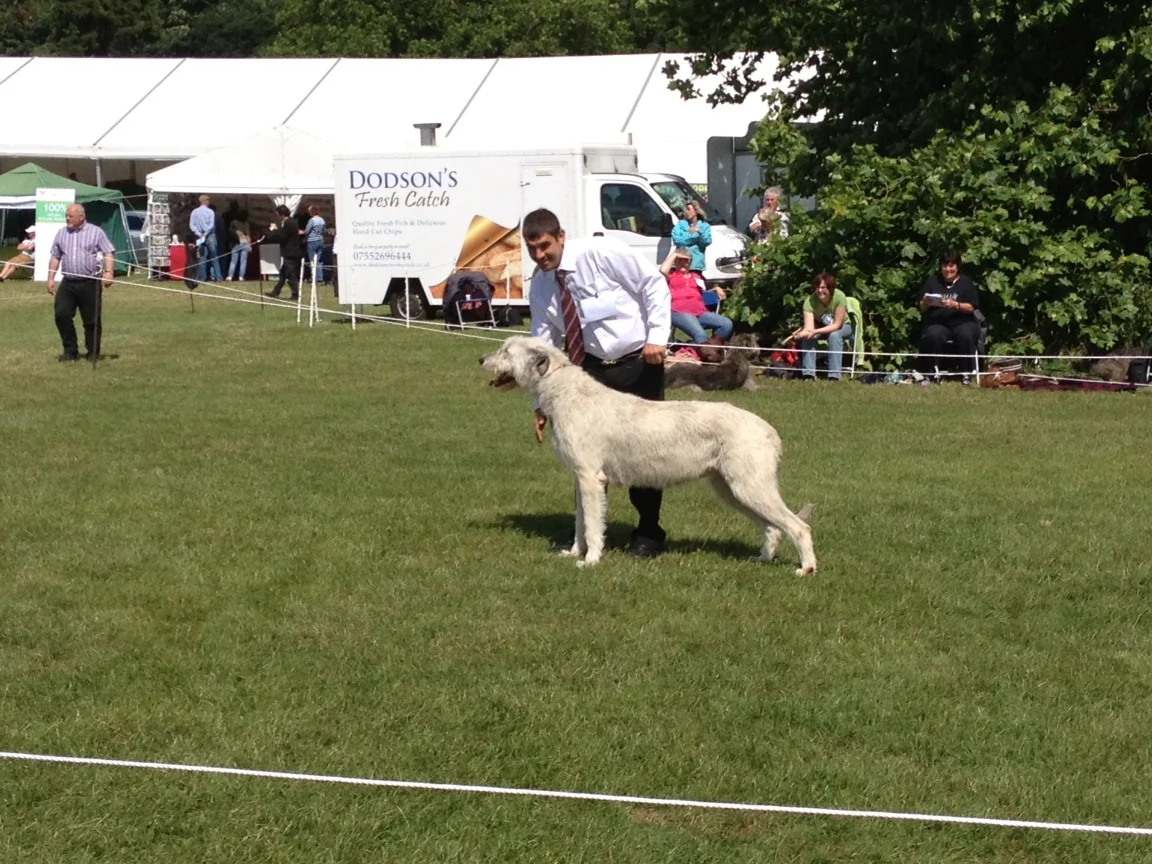Summary of the first owner-breeder research forum for Irish Wolfhounds and Deerhounds at the School of Veterinary Medicine and Science
Saturday 8th February 2014 saw the first Irish Wolfhound (IWH) and Deerhound owner/breeder research forum at the School of Veterinary Medicine and Science, University of Nottingham. A substantial number of owners and breeders of both IWH and Deerhounds managed to attend despite the awful weather in many parts of the country. In the morning, the delegates took part in facilitated discussions aimed at identifying particular health problems that they felt troubled their dogs. A number of owners and breeders then delivered interesting presentations which enabled further fruitful discussions during the afternoon session. Presentations from clinicians and researchers within the vet school were also given. These presentations enabled information, feedback and updates about the research presently carried out, and future directions within the School to be shared with breeders and owners. A number of health issues were highlighted as a result of these discussions, some already recognised and others that we were not aware of. Problems highlighted during discussions influencing one or both breeds included:
Cancer A major concern was the frequent diagnosis of osteosarcoma and the problems with some dogs having the diagnosis made at a surprisingly late stage
Bronchopneumonia The problems with severe respiratory tract disease in IWHs and the difficulties diagnosing and treating it
Cardiovascular disease Dilated cardiomyopathy remained a concern – despite the on-going research projects at other institutions on the subject
Fibrocartilagenous emboli (FCE) Many IWH owners and breeders considered this an increasingly important condition in young dogs
Gastric dilatation (bloat) The frequently encountered condition of bloat was considered important and a significant cause of distress in many dogs
Immunity and vaccinations There seemed to be increasing awareness of immune-related problems in these breeds, along with issues over vaccinations and autoimmunity
Lifestyle and general topics Neutering – merits of early neutering vs. remaining entire Longevity – influences on this and breeding to improve it in addition what constitutes a long-lived IWH and Deerhound The development of a general health database for epidemiology studies in the breeds Artificial insemination – the various problems encountered and methods to improve success
Following a panel discussion prior to the final session and using the points raised during the morning small group sessions, a number of problems became the focus of further discussion. A wider group discussion and vote then took place to determine priority breed health topics for both the IWH and Deerhounds. The topics that were considered most important for the IWH and Deerhounds were osteosarcoma, bronchopneumonia/respiratory tract disease, bloat and FCE. The topic of immunity/vaccination was also felt to be important, however as the immune system was integral to a number of the other topics it was thought this would be covered elsewhere. Owners and breeders of IWHs felt that FCE was increasingly reported in the breed, although this was not something that seemed to currently affect Deerhounds.
The meeting therefore finished having achieved its goals. Following some very constructive discussions in the morning and afternoon sessions, we ascertained the major concerns of those IWH and Deerhound owners and breeders in attendance. Those topics given priority will now be discussed in greater depth over the coming months and liaisons developed with the breed health groups to begin to undertake the task of formulating achievable research goals and securing the funding required to complete such projects. During the final discussion session, a number of additional areas were highlighted which delegates felt were important and required some input from clinicians and researchers alike. These were considered to be relatively ‘low hanging fruit’ in as much as they were not primary research topics but were important and outcomes could be achieved in a shorter time period. These were topics predominantly based around dissemination of information and improved communication.
These topics were as follows:
Ensuring appropriate feedback from clinicians and scientists involved in research projects to ensure owners and breeders that have taken part in studies are aware of progress
Enabling dissemination of information into breed related conditions within the veterinary profession. It was considered that this was an area that required significant improvement in both the IWH and Deerhound breeds.
The introduction of generic consent forms for primary care veterinary surgeons to use so that advanced consent for future projects could be obtained
Best practice guidelines –guidelines produced by the breed health groups to be developed in collaboration with Nottingham Vet School to ensure these were more widely accepted by the veterinary community
Progress updates in all of these areas will be posted on the School of Veterinary Medicine and Science website, disseminated to the breed health group co-ordinators and also via social media forums. Nottingham Vet School is developing separate sections of its website to provide information on these projects along with progress in all other areas of owners and breeder-led research. Details of how to access specific areas will follow in due course.
We would like to thank all of you who supported the day and we look forward to working with you in the future and to meeting up again in 2015.
With best wishes
Mark Dunning Clinical Associate Professor in Small Animal Medicine mark.dunning@nottingham.ac.uk









